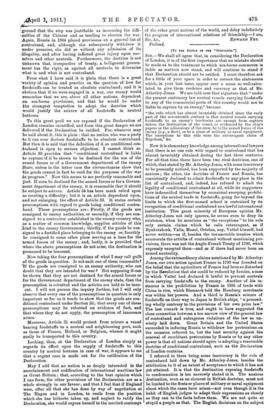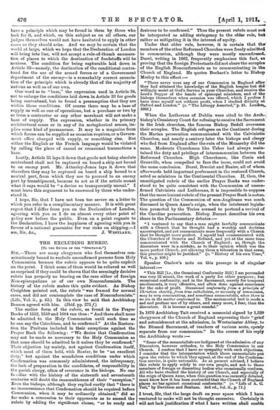I-TO m EDITOR. or TIM "Sescwros.") SIR,—We shall all agree
that, in considering the Declaration of London, it is of the first importance that no mistake should be made as to the treatment to which sea-borne commerce is liable as matters now stand, and will continue to stand if that Declaration should not be ratified. I must therefore ask
for a little of your space in order to correct the statements which, in your last issue, appear over a name so well calcu- lated to give them credence and currency as that of Mr.
Atherley-Jones. We are told over that signature that "under the present customary law neutral vessels carrying foodstuffs to any of the commercial ports of this country would not be liable to capture by an enemy," because
" the rule which has almost invariably obtained since the early part of the seventeenth century is that neutral vessels carrying foodstuffs to an enemy's territories are exempt from capture unless the destination of the vessel, as evidenced by the ship's papers or the admissions of the crew, be to the armed forces of the enemy (e.g., a fleet), or to a place of military or naval equipment. The exceptions to this rule were the extravagant claim of Napoleon," &c.
Now it is elementary knowledge among international lawyers
that there is no one rule with regard to contraband that has almost invariably obtained during the last three centuries.
For all that time there have been two rival doctrines, one of which, that stated by Mr. Atherley-Jones, with some inaccuracy to be presently noticed, has been supported by the majority of nations ; the other, the doctrine of France and Russia, has consistently declined to admit foodstuffs to any place in the list of contraband, and, indeed, has refused to admit the legality of conditional contraband at all, while its supporters have indemnified themselves by occasional sweeping prohibi- tions of the neutral trade in foodstuffs, going far beyond the limits to which the first-named school is restrained by its recognition of conditional contraband as a lawful international institution. This great minority of European opinion Mr.
Atherley-Jones not only ignores, he seems even to deny its existence, when he mentions as " the exceptions " to his rule only certain claims which he calls extravagant, as if Bynkershoek, Valin, Masse, Ortolan, nay, Vattel himself, had never written—as if, besides the innumerable treaties which enumerate the articles of contraband without mentioning pro- visions, there was not the Anglo-French Treaty of 1786, which expressly excepted them—and as if there had never been an armed neutrality.
Among the extraordinary claims mentioned by Mr. Atherley- Jones, our own action against France in 1793 was founded on the belief that the agriculture of France had been so disturbed by the Revolution that she could be reduced by famine, a case in which Vattel had declared it lawful to prevent neutrals from carrying foodstuffs to the enemy. Another of his in- stances is the prohibition by France in 1885 of trade with China in rice, which Bismarck told the Hamburg merchants was within her powers. And a third is Russia's seizure of foodstuffs on their way to Japan in British ships, " a proceed- ing wholly contrary to the provisions of her own prize law."
The last remark is true, and ought to have suggested the close connection between a too narrow view of the general law of contraband and outrageous violations of the law so un- wisely laid down. Great Britain and the United States succeeded in inducing Russia to withdraw her pretensions on the occasion referred to, but the best security against the renewal of exorbitant pretensions by Russia or by any other power is that all nations should agree in adopting a reasonable doctrine of conditional contraband, such as the Declaration of London contains.
I referred to there being some inaccuracy in the rule of contraband laid down by Mr. Atherley-Jones, besides the attribution to it of an extent of acceptance to which it has not yet attained. It is that the destination exposing foodstuffs to condemnation is too narrowly stated in it. The noxious destination, even as an element in British doctrine, must not be limited to the fleets or places of military or naval equipment about which the cases have arisen—not even though it is the habit of English judges to adapt their expressions as closely as they can to the facts before them. We are not quite so stupid a people as that. The English decisions on the subject have a principle which may be found in them by those who look for it, and which, on this subject as on all others, our judges themselves would not have hesitated to apply in other cases as they should arise. And we may be certain that the world at large, which we hope that the Declaration of London will bring into line, will not accept a rule-of-thumb enumera- tion of places to which the destination of foodstuffs will be noxious. The condition for being capturable laid down in Article 33—namely, the destination of the conditional contra- band for the use of the armed forces or of a Government department of the enemy—is a remarkably correct enuncia- tion of the principle which is already that of the majority of nations as well as of our own.
One word as to "base," the expression used in Article 34, not to enlarge the conditions laid down in Article 33 for goods being contraband, but to found a presumption that they are within those conditions. Of course there may be a base of supply as well as one of operations, but a purchase or two by or from a contractor or any other merchant will not make a base of supply. The expression, whether in its primary architectural sense or in any of its metaphorical senses, im- plies some kind of permanence. It may be a magazine from which forces can be supplied as occasion requires, or a Govern- ment office charged with supply, or something else. But either the English or the French language would be violated by calling the place of casual or occasional transactions a base.
Lastly, Article 35 lays it down that goods not being absolute contraband shall not be captured on board a ship not bound to an enemy port. Mr. Atherley-Jones lays it down that therefore they may be captured on board a ship bound to a neutral port, from which they are to proceed to an enemy port by transhipment, because to act as if the article meant what it says would be " a device so transparently unreal." I must leave this argument to be answered by those who under- stand it.
I hope, Sir, that I have not been too severe on a letter to which you refer in a complimentary manner. It is with great regret that I differ from you on the Declaration of London, agreeing with you as I do on almost every other point of policy now before the public. Even on a point cognate to the Declaration, I have the happiness of agreeing with you in favour of a national guarantee for war risks on shipping.—I











































 Previous page
Previous page